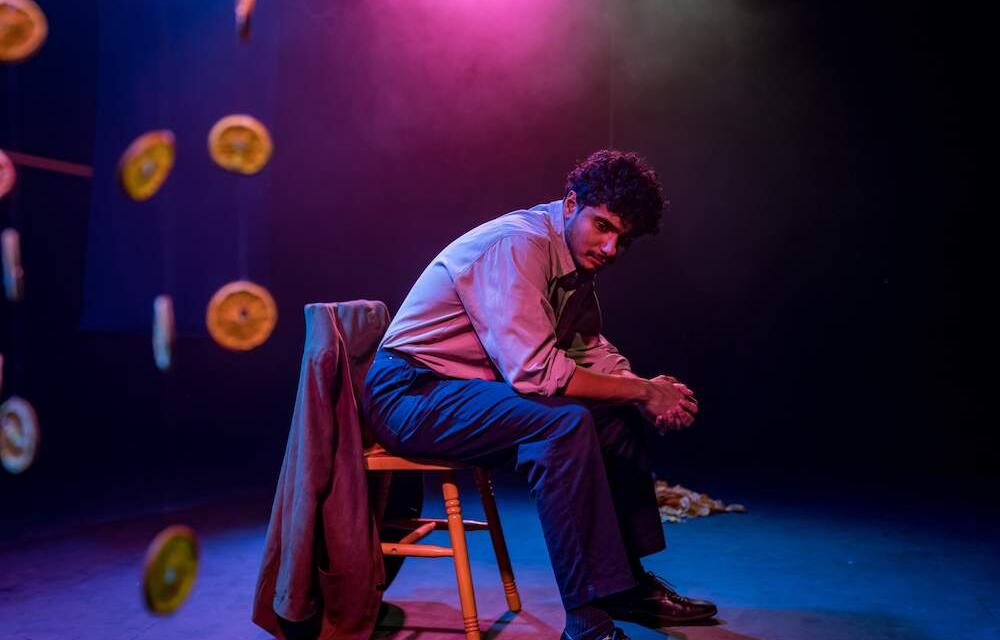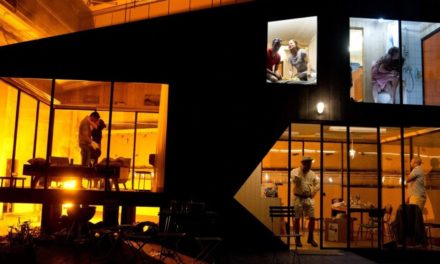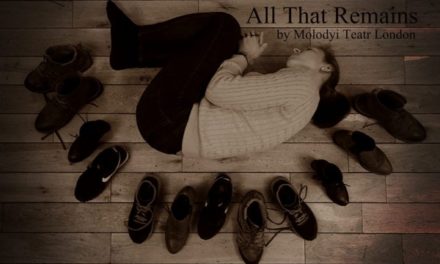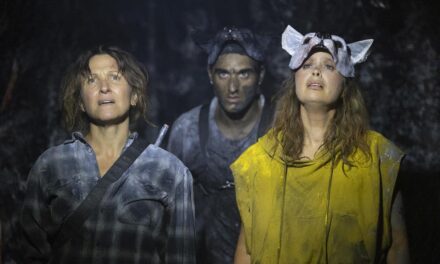Identity is the sum of the stories we tell ourselves. Some of these are personal, and some political. Sometimes they blend, sometimes clash. In Aaron Kilercioglu and Bilal Hasna’s excellently staged and thought-provoking For a Palestinian, the performer and co-author Hasna tells two stories: one about himself and his new love for Palestine, and the other about the Palestinian activist and translator Wa’el Zuaiter, and his love affair with Australian-born painter Janet Venn-Brown. Her 2006 book, For a Palestinian, tells the story of Zuaiter and his assassination in Rome in 1972 by Mossad.
Over about 80 minutes in a one-man show, Hasna switches between the personal and the public, beginning with his invitation to the wedding of his cousin Ahmed in West Jerusalem in 2018. Although he is a British university student, and hasn’t been to Palestine since 2011, when he was 12 years old, he experiences not only the joyful celebrations of the wedding, but remembers the smell of the Middle Eastern orange groves from childhood. It is this blending of sensual pleasure, deep if semi-articulate feelings and vivid memories, that motivates Hasna to take a dive into his own heritage, and his discovery of Zuaiter’s life story.
Born in Nablus, the multi-lingual Zuaiter spent much of his adult life in exile in Rome, where he worked on translations of One Thousand and One Nights, fell in love with Venn-Brown, and set up the country’s Palestine solidarity group. During the Six-Day War of 1967, he travelled across Europe in a borrowed Fiat, determined to fight on the Arab side — only to arrive too late. Later, as a member of the PLO, he was suspected by Israel of being part of Black September, the group which killed 11 Israeli athletes at the Munich Olympics in 1972, and this resulted in his death.
Written by Kilercioglu (who also directs) and Hasna, the two stories are beautifully interwoven with a beguiling mixture of humour and political passion. The central theme of love — for a person; for a land — is presented as a tapestry of different emotions, which include anger as well as desire. If love can heal, it can also tear people apart. Political passions, provoked by the love of your country, can lead to destructive violence, on every side. Of course, the play cannot offer solutions to the problems of the Middle East, and the text meanders a bit towards the end as its writers struggle to find a suitable ending. But perhaps this uncertainty is apt for the subject.
After all, the mentions of One Thousand and One Nights suggest that stories never really end, and the play itself is a kind of testament to this persuasive idea. With the inclusion of recorded excerpts of interviews with Hasna’s relatives, witnesses to events in the Middle East and news clips, the production offers a collage of facts and feelings. Although Hasna’s father came to Britain aged 17 and says that this country has been good to him, the script also attacks British colonial involvement in Palestine. In general, if the terrible sufferings of Jews are not ignored, the Israeli occupation of the West Bank remains an international scandal.
On a bare stage decorated by Jida Akil with dried orange slices and a Palestinian flag, Hasna voices all of the characters, whether they are Arab, Australian, Italian or English, giving a real emotional energy to lovers’ disputes and peopling the Rome sequences with several well-defined personalities, from the Italian landlady to the English ex-pat. Each change of character is clearly marked, and the most memorable passages are when Hasna dances exuberantly at the wedding and when the path of love does not run smooth for Zuaiter. At the end, the actor breaks character, and addresses us directly with a welcome reminder that events in the past are still with us, and that anyone can change the world.
- For a Palestinian is at Camden People’s Theatre until 1 October, then at Bristol Old Vic, 13-16 October.
This post was written by the author in their personal capacity.The opinions expressed in this article are the author’s own and do not reflect the view of The Theatre Times, their staff or collaborators.
This post was written by Aleks Sierz.
The views expressed here belong to the author and do not necessarily reflect our views and opinions.


















